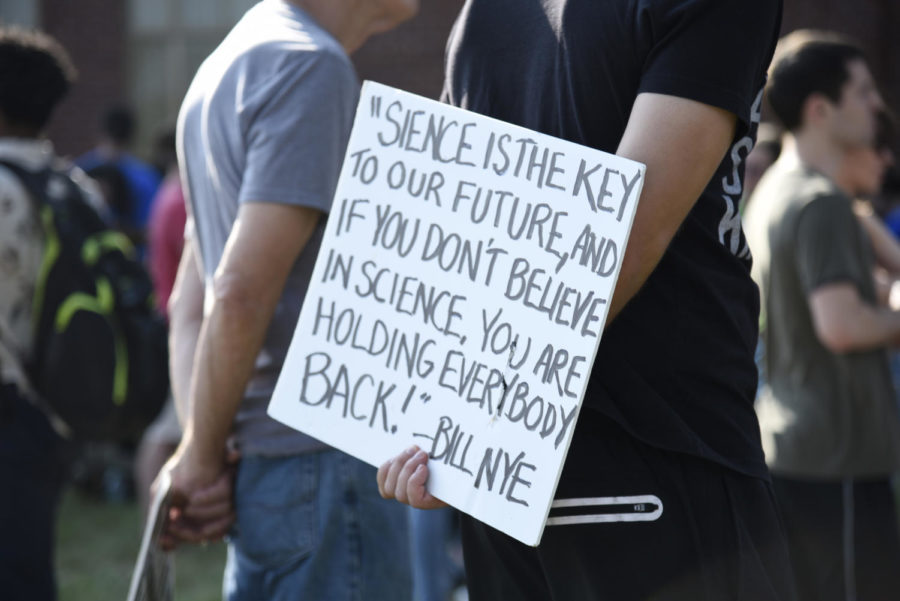Ames focuses on sustainability
Caitlin Yamada/ Iowa State Daily
A climate protest from 3 to 5 p.m. Sept. 20, 2019, at Ames City Hall. Different signs and speeches encouraged attendees to change habits to help the environment.
April 29, 2021
The Ames community is prioritizing environmental sustainability, and the Ames City Council, Iowa State and college students are all contributing.
The City Council has decided to initiate a Climate Action Plan for the city of Ames. A Climate Action Plan is a plan that communities develop to help reduce their greenhouse gas emissions and environmental impact in general. Other Iowa communities, such as Des Moines, Linn County and Iowa City, have already implemented their own action plans.
The City Council has started a task force to help with this project that will be made up of selected Ames residents and Iowa State students. There will be 22 spots, with two being student representatives.
To help develop a plan for Ames, the City Council has chosen Sustainable Solutions Group (SSG) Workers Cooperation to lead the effort over the next 18 months. SSG is based out of Vancouver, Canada, and has developed climate plans for communities across Canada as well as some in the U.S. The City Council selected SSG because communities they have worked for in the past have described them as “creative” in how they engage the community with each project.
Rep. Timothy Gartin said they will work with SSG to create a plan that is tailored to Ames. He also expressed his opinion on making sure the plan is done correctly.
“I am not interested in a Climate Action Plan that does nothing,” Gartin said. “So, if this just becomes a plan that we all adopt with fanfare, it sits on the shelf and really does nothing, then what have we done?”
Iowa State has also been working on its own sustainability initiative. Last October, President Wendy Wintersteen endorsed the Sustainability Plan for Operations. The main goals of the plan are to reduce energy usage on campus, triple spending on renewable energy and switch completely from coal to natural gas by 2025.
Merry Rankin, the director of sustainability at Iowa State, said the university is on track to meet its goals and emphasized the benefits and importance of the changes.
“If we look at the added energy efficiency that we will have, we look at the reduction in fuel costs from switching from coal to natural gas, we look at the reduction in costs associated with maintaining and operating coal boilers versus natural gas boilers,” Rankin said. “We’re expecting this project to be paid back in four years.”
Rankin said that from the coal to gas switch alone, they expect to reduce carbon emissions by 50 percent, but she believes even more can be done.
“This switch from coal to natural gas is definitely not what we consider our long-term solution,” Rankin said. “We are always looking for opportunities to continue to increase efficiencies and move away from nonrenewable sources toward renewable sources.”
The tripling of the renewable energy spending will be done by purchasing Renewable Energy Credits (REC). RECs represent the clean energy attributes of renewable electricity. Each REC is worth one megawatt-hour of electricity. Essentially, Iowa State is purchasing only the clean energy that is produced from its sources. Iowa State plans to buy an equal amount of RECs for any amount of electricity that is purchased by the university.
In addition to the main goals, Iowa State is currently developing plans to improve waste management, building operation and maintenance and water usage.
Iowa State students are also doing their part to improve the community’s impact on the environment. Student Government’s Sustainability Committee has been responsible for a number of environmental efforts over the past year. A pilot program was launched to increase the number of recycling bins in buildings around campus. They also started a program to begin installing paper towel composters in bathrooms, and they were able to get $36,000 to spend on six new solar-powered recycling compactors.
Jennifer Seth, senior in environmental science and chair of the Student Government Sustainability Committee for the past year, believes the environment and sustainability in Ames is something all students should care about.
If students want to get involved in sustainability efforts, Seth recommends they think about helping the Sustainability Committee or join one of the many sustainability groups on campus, such as Climate Reality and Green Umbrella.
“The impact of these issues is ubiquitous,” Seth said. “Environmental issues affect everyone. It can affect the economy that students will live in and will affect their children after them. It also affects the community they live in today. Everyone should be interested in learning how to mitigate our impact and better utilize resources.”







